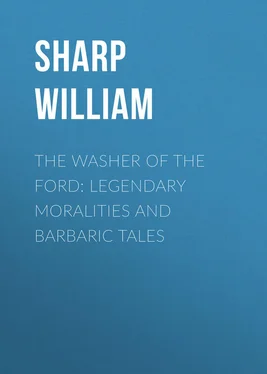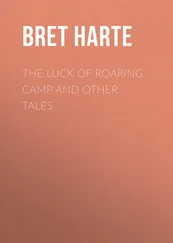William Sharp - The Washer of the Ford - Legendary moralities and barbaric tales
Здесь есть возможность читать онлайн «William Sharp - The Washer of the Ford - Legendary moralities and barbaric tales» — ознакомительный отрывок электронной книги совершенно бесплатно, а после прочтения отрывка купить полную версию. В некоторых случаях можно слушать аудио, скачать через торрент в формате fb2 и присутствует краткое содержание. Жанр: foreign_antique, foreign_prose, на английском языке. Описание произведения, (предисловие) а так же отзывы посетителей доступны на портале библиотеки ЛибКат.
- Название:The Washer of the Ford: Legendary moralities and barbaric tales
- Автор:
- Жанр:
- Год:неизвестен
- ISBN:нет данных
- Рейтинг книги:3 / 5. Голосов: 1
-
Избранное:Добавить в избранное
- Отзывы:
-
Ваша оценка:
- 60
- 1
- 2
- 3
- 4
- 5
The Washer of the Ford: Legendary moralities and barbaric tales: краткое содержание, описание и аннотация
Предлагаем к чтению аннотацию, описание, краткое содержание или предисловие (зависит от того, что написал сам автор книги «The Washer of the Ford: Legendary moralities and barbaric tales»). Если вы не нашли необходимую информацию о книге — напишите в комментариях, мы постараемся отыскать её.
The Washer of the Ford: Legendary moralities and barbaric tales — читать онлайн ознакомительный отрывок
Ниже представлен текст книги, разбитый по страницам. Система сохранения места последней прочитанной страницы, позволяет с удобством читать онлайн бесплатно книгу «The Washer of the Ford: Legendary moralities and barbaric tales», без необходимости каждый раз заново искать на чём Вы остановились. Поставьте закладку, и сможете в любой момент перейти на страницу, на которой закончили чтение.
Интервал:
Закладка:
But the child only nestled closer. Like a fledgling in a great nest she was. If God heard her song, He was a glad God that day. The blood that was in her body called to the blood that was in his body. He could say no word. The tears were in his blind eyes.
Then Hildyr leaned into the dark, and took his harp, and played upon it. It was of the fonnsheen he had learned, far, far away, where the isles are.
She sang: but he could not hear what she sang.
Then the little lips, that were like a cool wave upon the dry sand of his life, whispered into a low song: and the wavering of it was like this in his brain —
Where the winds gather
The souls of the dead,
O Torcall, my father,
My soul is led!
In Hildyr-mead
I was thrown, I was sown:
Out of thy seed
I am sprung, I am blown!
But where is the way
For Hildyr and me,
By the hill-moss gray
Or the gray sea?
For a river is here,
And a whirling sword —
And a Woman washing
By a Ford!
With that, Torcall Dall gave a wild cry, and sheathed an arm about the wee white one, and put out a hand to the bosom that loved him. But there was no white breast there, and no white babe: and what was against his lips was his own hand red with blood.
“O Hildyr!” he cried.
But only the splashing of the waves did he hear.
“O white one!” he cried.
But only the scream of a sea-mew, as it hovered over that boat filled with dead men, made answer.
III
All day the Blind Harper steered the galley of the dead. There was a faint wind moving out of the west. The boat went before it, slow, and with a low, sighing wash.
Torcall saw the red gaping wounds of the dead, and the glassy eyes of the nine men.
“It is better not to be blind and to see the dead,” he muttered, “than to be blind and to see the dead.”
The man who had been steersman leaned against him. He took him in his shuddering grip and thrust him into the sea.
But when, an hour later, he put his hand to the coolness of the water, he drew it back with a cry, for it was on the cold, stiff face of the dead man that it had fallen. The long hair had caught in a cleft in the leather where the withes had given.
For another hour Torcall sat with his chin in his right hand, and his unseeing eyes staring upon the dead. He heard no sound at all, save the lap of wave upon wave, and the suss of spray against spray, and a bubbling beneath the boat, and the low, steady swish of the body that trailed alongside the steering oar.
At the second hour before sundown he lifted his head. The sound he heard was the sound of waves beating upon rocks.
At the hour before sundown he moved the oar rapidly to and fro, and cut away the body that trailed behind the boat. The noise of the waves upon the rocks was now a loud song.
When the last sunfire burned upon his neck and made the long hair upon his shoulders ashine, he smelt the green smell of grass. Then it was too that he heard the muffled fall of the sea, in a quiet haven, where shelves of sand were.
He followed that sound, and while he strained to hear any voice the boat grided upon the sand, and drifted to one side. Taking his harp, Torcall drove an oar into the sand, and leaped on to the shore. When he was there, he listened. There was silence. Far, far away he heard the falling of a mountain-torrent, and the thin, faint cry of an eagle, where the sun-flame dyed its eyrie as with streaming blood.
So he lifted his harp, and, harping low, with a strange, wild song on his lips, moved away from that place, and gave no more thought to the dead.
It was deep gloaming when he came to a wood. He felt the cold green breath of it.
“Come,” said a voice, low and sweet.
“And who will you be?” asked Torcall the Harper, trembling because of the sudden voice in the stillness.
“I am a child, and here is my hand, and I will lead you, Torcall of Lochlin.”
The blind man had fear upon him.
“Who are you that in a strange place are for knowing who I am?”
“Come.”
“Ay, sure, it is coming I am, white one; but tell me who you are, and whence you came, and whither we go.”
Then a voice that he knew sang:
O where the winds gather
The souls of the dead,
O Torcall, my father,
My soul is led!
But a river is here,
And a whirling Sword —
And a Woman washing
By a Ford!
Torcall Dall was as the last leaf on a tree at that.
“Were you on the boat?” he whispered hoarsely.
But it seemed to him that another voice answered: “ Yea, even so. ”
“Tell me, for I have blindness: Is it peace?”
“It is peace.”
“Are you man, or child, or of the Hidden People?”
“I am a shepherd.”
“A shepherd? Then, sure, you will guide me through this wood? And what will be beyond this wood?”
“A river.”
“And what river will that be?”
“Deep and terrible. It runs through the Valley of the Shadow.”
“And is there no ford there?”
“Ay, there is a ford.”
“And who will guide me across that ford?”
“She.”
“Who?”
“The Washer of the Ford.”
But hereat Torcall Dall gave a sore cry and snatched his hand away, and fled sidelong into an alley of the wood.
It was moonshine when he lay down, weary. The sound of flowing water filled his ears.
“Come,” said a voice.
So he rose and went. When the cold breath of the water was upon his face, the guide that led him put a fruit into his hand.
“Eat, Torcall Dall!”
He ate. He was no more Torcall Dall. His sight was upon him again. Out of the blackness shadows came; out of the shadows, the great boughs of trees; from the boughs, dark branches and dark clusters of leaves; above the branches, white stars; below the branches, white flowers; and beyond these, the moonshine on the grass and the moonfire on the flowing of a river dark and deep.
“Take your harp, O Harper, and sing the song of what you see.”
Torcall heard the voice, but saw no one. No shadow moved. Then he walked out upon the moonlit grass; and at the ford he saw a woman stooping and washing shroud after shroud of woven sunbeams: washing them there in the flowing water, and singing a low song that he did not hear. He did not see her face. But she was young, and with long black hair that fell like the shadow of night over a white rock.
So Torcall took his harp, and he sang:
Glory to the great Gods, it is no Sword I am seeing:
Nor do I see aught but the flowing of a river.
And I see shadows on the flow that are ever fleeing,
And I see a woman washing shrouds for ever and ever.
Then he ceased, for he heard the woman sing:
Glory to God on high, and to Mary, Mother of Jesus,
Here am I washing away the sins of the shriven,
O Torcall of Lochlin, throw off the red sins that ye cherish
And I will be giving you the washen shroud that they wear in Heaven.
Filled with a great awe, Torcall bowed his head. Then once more he took his harp, and he sang:
O well it is I am seeing, Woman of the Shrouds,
That you have not for me any whirling of the Sword:
I have lost my gods, O woman, so what will the name be
Of thee and thy gods, O woman that art Washer of the Ford?
But the woman did not look up from the dark water, nor did she cease from washing the shrouds made of the woven moonbeams. But he heard this song above the sighing of the water:
It is Mary Magdalene my name is, and I loved Christ.
And Christ is the son of God, and Mary the Mother of Heaven.
And this river is the river of death, and the shadows
Are the fleeing souls that are lost if they be not shriven.
Интервал:
Закладка:
Похожие книги на «The Washer of the Ford: Legendary moralities and barbaric tales»
Представляем Вашему вниманию похожие книги на «The Washer of the Ford: Legendary moralities and barbaric tales» списком для выбора. Мы отобрали схожую по названию и смыслу литературу в надежде предоставить читателям больше вариантов отыскать новые, интересные, ещё непрочитанные произведения.
Обсуждение, отзывы о книге «The Washer of the Ford: Legendary moralities and barbaric tales» и просто собственные мнения читателей. Оставьте ваши комментарии, напишите, что Вы думаете о произведении, его смысле или главных героях. Укажите что конкретно понравилось, а что нет, и почему Вы так считаете.












